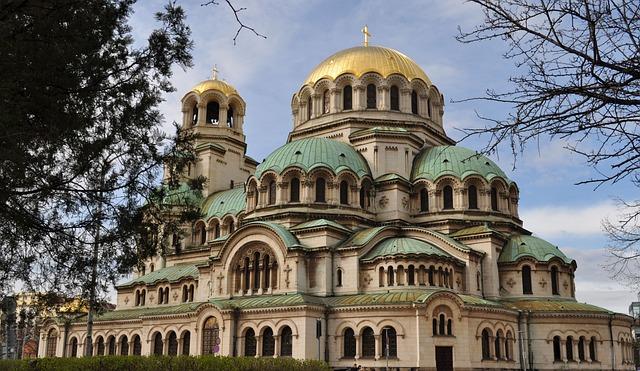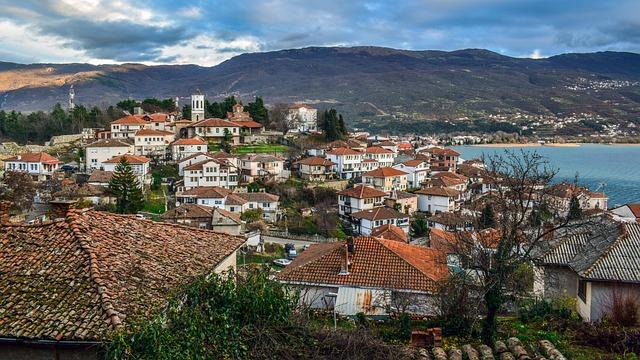In a climate of heightened diplomatic tension, Germany has expressed optimism regarding the resolution of the ongoing dispute between the European Union and North Macedonia, particularly in light of an upcoming vote by Bulgaria. As key EU member states grapple with the complexities of regional politics and the aspirations of North Macedonia for EU membership, Berlin’s confidence underscores a pivotal moment in the Balkans’ integration process. This article delves into the nuances of the dispute, Bulgaria’s role in the European dialog, and the implications for both North macedonia and the broader EU framework. As the geopolitical landscape continues to shift, the need for collaborative solutions grows ever more pressing.
germany Expresses Optimism Over EU-North Macedonia Tensions Amid Bulgarias Vote

Germany has expressed a positive outlook regarding the ongoing tensions between the european Union and North Macedonia,especially in light of bulgaria’s impending vote. The situation,which has been a point of contention,involves disagreements primarily driven by historical issues and bilateral relations between Bulgaria and North Macedonia. Many European leaders, including those in Germany, beleive that progress can be made once Bulgaria resolves its domestic political challenges, paving the way for a collaborative approach to furthering North Macedonia’s EU accession prospects.
As the vote approaches, German officials have highlighted several key factors that could foster a resolution:
- Mutual Recognition: Encouraging both nations to acknowledge each other’s cultural and historical narratives.
- Diplomatic Engagement: Continued dialogue among EU member states to promote understanding and cooperation.
- EU Support: Leveraging European institutions to provide assistance and mediation when necessary.
| Factors for Resolution | Implications |
|---|---|
| Strengthened Bilateral Relations | Potential for economic collaborations and joint initiatives. |
| Increased EU Involvement | Higher likelihood of North Macedonia’s accession timelines being met. |
Analyzing the Roots of the Dispute Between EU and North Macedonia

The ongoing tensions between the European Union and North Macedonia can be traced back to several historical, political, and cultural factors. central to this dispute is the issue of identity, particularly concerning language and heritage. After the signing of the Prespa Agreement in 2018, which aimed to resolve the long-standing naming dispute with Greece, North Macedonia gained a path toward EU accession. Though, this journey has been elaborate by Bulgaria’s demands, which have intensified local apprehensions about national identity. Bulgaria has insisted on specific revisions to the constitution concerning the recognition of minority rights, often feeding into a narrative that questions the very essence of what it means to be Macedonian. this position has created a deep rift, complicating North Macedonia’s EU ambitions and fueling nationalist sentiments within the country.
Moreover, the role of Geopolitical dynamics cannot be overlooked in understanding the friction. The EU’s enlargement strategy has been criticized for its inconsistencies, especially as geopolitical influences from other countries have emerged. as Bulgaria’s political landscape continues to evolve,the forthcoming vote is seen as pivotal. Key factors influencing this situation include:
- Geographical Considerations: North Macedonia’s location as a gateway between Europe and the Balkans.
- Historical Context: Historical grievances stemming from both Bulgarian and Macedonian narratives.
- Political Will: The commitment of EU member states to support or hinder North Macedonia’s aspirations.
Bulgarias Legislative Decision: A Crucial Step Toward Regional Harmony

The recent legislative decision by Bulgaria marks a pivotal moment in Balkan affairs, substantially shaping the dynamics between the European Union and North Macedonia. With a legislative framework now in place, Bulgaria’s actions have been interpreted as a beacon of hope for reconciliation and collaborative progress in the region.This decision has the potential to alleviate long-standing tensions,fostering a conducive surroundings for dialogue and addressing historical grievances. Such a shift could pave the way for North Macedonia’s advancement towards EU accession, a process that has been mired in complications largely due to bilateral disputes with Sofia.
Germany has expressed optimism that Bulgaria’s recent vote will act as a catalyst for resolving outstanding issues. This sentiment underscores the importance of diplomatic engagement in achieving lasting regional harmony. Key aspects of this legislative decision include:
- Strengthened Bilateral Relations: An emphasis on cooperation between bulgaria and North macedonia.
- Roadmap to EU Accession: Clearer pathways for North Macedonia’s integration into the EU.
- Historical dialogue: Encouraging conversations around shared histories and mutual respect.
This pivotal moment also raises the question of how other EU member states will react. The international community is closely monitoring this situation, as it highlights the ongoing challenges and opportunities in the Western Balkans. Continued support from Germany and other EU partners could solidify this movement toward harmony and stability.
The Role of Germany in Facilitating Dialogue and Negotiation

Germany has emerged as a pivotal player in the ongoing tensions between the EU and north Macedonia, particularly following the recent disputes involving Bulgaria. With its historical commitment to European integration and stability in the Balkans, Germany is leveraging its influence to foster meaningful dialogue among the parties involved. The focus is on maintaining a cohesive approach within the EU to promote constructive negotiations that can pave the way for North Macedonia’s accession to the European Union. This effort underscores Germany’s understanding of regional dynamics and its willingness to act as a mediator in bridging gaps between conflicting interests.
Key to Germany’s strategy is its reliance on diplomatic channels and support for initiatives that prioritize collaboration and compromise. The German government has emphasized several core areas to facilitate dialogue:
- Strengthening bilateral relations between North Macedonia and bulgaria.
- Encouraging open interaction among EU member states regarding their positions and concerns.
- Promoting a unified stance within the EU on enlargement policy.
By positioning itself as a facilitator, Germany aims to create an environment where trust can be rebuilt, and mutual concessions can lead to a sustainable resolution. This approach is crucial not only for the future of North Macedonia but for the EU’s credibility in the region, as it navigates the complexities of expansion while maintaining unity among its members.
Recommendations for Strengthening EU-North Macedonia relations Moving Forward

To advance EU-North Macedonia relations, a multifaceted approach that emphasizes dialogue and cooperation is essential. Engaging in regular bilateral discussions between leaders of the EU and North Macedonia will foster mutual understanding.Additionally, it is crucial to involve civil society and grassroots organizations to amplify voices from both sides. Emphasizing the importance of cultural exchanges and joint educational programs can build bridges and enhance people-to-people connections, reflecting the shared values of European unity and diversity.
Furthermore, a clear roadmap of priorities should be established that addresses both economic cooperation and political reforms. This includes enhancing trade relations and investment opportunities that can contribute to the socio-economic growth of North Macedonia. Collaborative projects in areas such as energy, infrastructure, and technology can also be avenues for strengthening ties. Regular assessments and dialogues should be instituted to monitor progress, ensuring both parties are committed to addressing challenges proactively and maintaining momentum in the relationship.
Implications of the Resolution for Broader Balkan Stability and EU Integration

The recent resolution regarding the diplomatic rift between North Macedonia and Bulgaria could serve as a pivotal moment for the broader stability of the Balkans. As regional tensions frequently arise from historical grievances and ethnic complexities, a resolution may foster an environment conducive to peace and cooperation among neighboring states. Stable bilateral relations between North Macedonia and Bulgaria would not only bolster their respective economies but also pave the way for collaborative approaches to pressing issues such as migration, trade, and energy security. The implications of triumphant diplomacy are far-reaching:
- Enhanced regional cooperation on security matters.
- improved economic development through trade agreements.
- Strengthened societal ties amongst Slavic and ethnic communities.
The potential resolution could also accelerate North Macedonia’s aspiration for EU integration, a process that has been stalled due to ongoing disputes with Bulgaria. If Bulgaria’s vote clears the path for North Macedonia to progress within EU frameworks, it may set a precedent for other Balkan nations seeking accession. The EU stands to benefit significantly from a stable region,as this would reduce the potential for conflict and promote adherence to European values such as democracy and rule of law. Key areas of impact may include:
| Factor | Impact |
|---|---|
| EU Membership Progress | Faster accession for North Macedonia. |
| Regional Stability | Decreased likelihood of ethnic tensions. |
| Economic Growth | Increased foreign investments. |
The Conclusion
Germany’s optimism regarding the resolution of the EU-North Macedonia dispute underscores the intricate balance of regional diplomacy within the european Union. with Bulgaria’s recent vote serving as a pivotal moment in this ongoing saga, stakeholders are hopeful that a renewed spirit of cooperation will pave the way for constructive dialogue and progress. As the EU continues to navigate the complexities of its enlargement strategy, the commitment to fostering stability in the Western Balkans remains a priority. Moving forward, the outcome of these discussions will not only impact North Macedonia’s European aspirations but also reflect the EU’s ability to unify its member states in the face of geopolitical challenges. Continued vigilance and engagement will be crucial as the situation unfolds, highlighting the essential role of diplomacy in shaping the future of Europe.
















